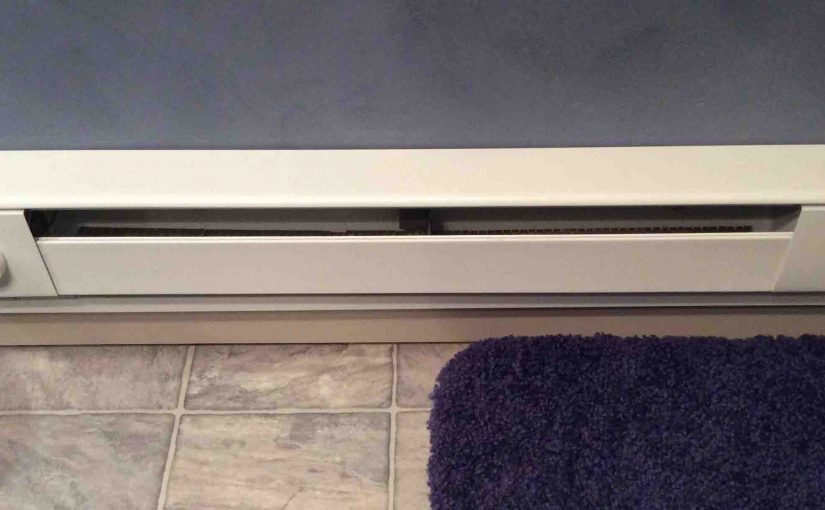Electric heating is one of the easiest ways to keep your home warm during cold winter spells. In this piece, we discuss the many electric heat pros and cons. Many down sides to this mode of heating including higher fuel costs. But many up sides as well. E.g. No carbon monoxide. Easy to install. Low heater repair cost. You can get electric heating in many forms such as…
- Baseboard convection heaters.
- Hydronic heaters.
- Radiant infrared space heaters.
- Forced air portable units.
- Ceiling panels.
- Whole-house electric furnaces.
Electric heat is known for being quite costly over the long run. But in our decades-long use of it, we found that you get what you pay for. We found that this form of heat is quite efficient so long as you have well insulated windows and doors. Also, keep those doors and windows closed when the heat it on.
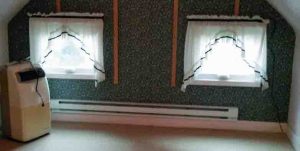
Electric Heat Pros and Cons: The Advantages, Pros, and Benefits
Simple design
Easy to understand how electric heat works. Electricity is routed via the wiring to a heater. This resister they switch on, off, high, and low with a thermostat.
Simple Parts
There’s really little more to most electric heaters than a large heating resister, wiring, and a t-stat. This makes the system less likely to break down, highly reliable, and cheaper to fix if it does.
Highly Scalable
Electric heaters come in many sizes. These range from the smallest cube form quartz portable heaters. Then, they go on up to the 220-volt radiant ceiling units. These large heaters can warm a whole basement. You can also buy whole house electric furnaces. These often cost much less than gas or oil central heating.
Electric Heat Works Almost Everywhere in the Home
You can put electric heat in most any room. Do not install natural gas heaters in bedrooms. But electric heaters work well in just about any dry fume-free place, including bedrooms, nurseries, and basements.
No Risk of Carbon Monoxide Poisoning, Electric Heat Pros and Cons
Electric heat creates no fumes with normal use.
Easy to Install, Repair, and Replace
Installing electric heating takes more muscle than brain power. Indeed, the hardest part in our projects, was running the power cables inside walls and above ceilings. Plus, they usually secure the heaters to the house by simple wood screws. These fasteners you can quickly take out for heater repair. And, if you must replace the heater, you can quickly undo its simple wire connections for easy old eheater removal.
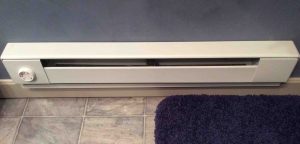
Lightweight
Most electric heaters are more portable than gas or kerosene units.
No Fuel Spillage
No worries about spilling the fuel with electric heat. You can’t spill electricity after all. These units are generally lighter. Plus, today’s designs have almost no exposed too-hot-to-touch surfaces. So, even while hot, you can still move the portable space heater where you need the heat.
Very Safe
Virtually no chance of asphyxiation or house fires, unless of course you wrongly installed these heaters. No flames are present in electric heat. So, with the right wiring of heater and supporting devices and fixtures, electric heaters will not shock you.
Can be Decentralized, Electric Heat Pros and Cons
Each room can have its own electric heating system and t-stat. This gives independent temperature control from the rest of the house. So no more excessive cold in one room while another is too hot. Big advantage over central heating.
Electric Heat is Usually Quiet
Hydronic type heaters especially, tend to function with near silence.
Electricity Found in More Places
Electricity is available in more locales than natural gas or other fuels. Plus, it’s cheaper to run wires to electric heaters, than to plumb black iron pipes to gas heaters.
More BTUs than Other “Energy Saving” Heat Forms
Electric heat makes warmer air than a heat pump, generally speaking. It’s quieter than heat pumps. Even the forced air electric heaters have only a low-current fan motor.
Less Cost to Maintain, Electric Heat Pros and Cons
Aside from routine cleaning, electric heaters need no maintenance. They just run and run, until they’re done; typically two decades or more.
Fewer Single Points of Failure
Without central heating, should one heater fail, you don’t lose heat to the rest of the home.
No Ventilation Needed
Requires no vent to the outside via a chimney or wall vent, unlike many fossil fuel powered heaters.
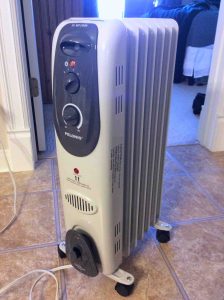
Electric Heat Pros and Cons: The Disadvantages, Cons, Problems, and Limitations
Costly to Operate
Larger homes may at times need 20 kilowatt hours (KWHs) to 30 KWHs for enough warmth throughout. At fifteen cents per KWH, this hour of heating could cost as much as $3 to $4,50 per hour. Not too bad if all you had to pay for was a single hour. But a whole month of January heat may cost you near a grand with electric heat.
Can Be Noisy
Cheaper electric heaters often emit buzzing, humming, ringing, ticking, banging, popping, whistling, hissing, and squealing sounds when “fired up”. But this is far less the case with hydronic electric heating. So if you heat your house with electricity, choose hydronic heaters for the most quiet heating.
Can Be Dangerous, Electric Heat Pros and Cons
Incorrect wiring can pose deadly shock hazards with electric heat. Further, some older heaters may have very hot surfaces. So keep children away from them. Or, make sure that you install such heaters out of children’s reach.
Creates Very Low Humidity
Can produce quite dry air within the heated space. This can cause static electricity, irritate throats, and trigger nose bleeds. The best installations of electric heating also include a humidifier. This helps keep the warm air inside the home moist.
You May Need Larger Service Panels
Heating a whole home with electric heat will likely demand higher current capacity pole-to-house wiring. This is likely true if your service is several decades old or more. Also, you’ll need more branch circuits for each of the heaters. Now gas heating usually needs the professional services of a plumber to install. But you may need an electrician, as mandated by many local codes, to install and service your electric heaters; like when you install them permanently.
Electric Heat is a Huge Energy Hog, Electric Heat Pros and Cons
Electric heating is not the most “green” choice. This is likely true if the power comes from a coal fired, nuclear, or other fossil fuel based plant.
Stringent Power Handling Needs
For the portable heater units, take care when powering via an extension cord. Watch that this extra cord safely carries the heater current. The cord should not run too warm. Wrongly sized cables can make a fire danger. So never power installed heaters through an extension cord, no matter how thick that cord is.
You May Need More Insulation
To limit operating costs, you need good insulation in the home. Its specs should meet or exceed standard suggested levels. If the specs call for R12 for example, use R24 where space permits. Triple-pane windows, well-insulated doors, and glass block window units in the basement really cut electricity bills.
Harder to Switch to Electric Heat in Poorly Insulated Homes, Electric Heat Pros and Cons
Can be hard to retrofit electric heating into older homes. In these houses, you may struggle to add more insulation. Why? Because it might be too costly to cut holes to fill inside walls with it.
220 Volt Wiring Often Needed for Electric Heat
High power electric units (those drawing in excess of 1500 watts) usually must run on 220 volts. So you cannot simply plug them into an AC wall outlet. Instead, either hard wire the heaters, or install a 220-volt outlet in each place you need them. The connecting cables for this type of installation though, are heavy, thick, and a struggle to manage. Hard wiring for non portable heaters is best therefore.
Electric Heaters Need Regular Cleaning
Often, particularly in convection electric heaters, the heater has thin metal fins attached to it. Through these, the air passes and is thus, warmed. So these convection fins often grow quite dusty. But if not cleaned often enough, they can give off a burning smell. Or, at worst, dust can form a sort of insulation around the heating element. This dust layer might cause it to overheat and burn out. So keep your heaters clean !
Electric Heat Pros and Cons: These Heaters can have Sharp Fins
These thin metal fins are sharp and easily bent. So take care when cleaning them, not to damage them or cut yourself.
Electric Heat Usually Needs Line-Voltage Thermostats
That is, unless you add control switching equipment (like a relay), that has a low-voltage operated switch. This can make wiring them harder and risky. So please know how to wire high voltage circuits safely. Do not try this job if you don’t or you fear working with electric circuits.
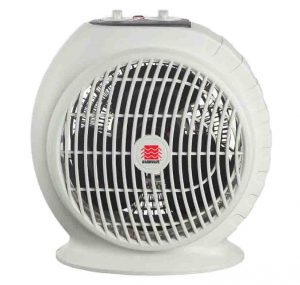
Our Preferences
Over all, we prefer electric heating where it’s practical. Indeed, de-centralized heating is the way to go. Why? Because you can control the temperature in each room separately. Heaters are easy to repair and cheap to replace. Plus, should you lose heat in one room, the other heaters keep working.
Related Posts to Electric Heat Pros and Cons
- Baseboard Heater Installation Tips
- Safest Electric Space Heaters, How to Choose
- Pelonis Electric Radiator Heater, 7 Fin, Oil-Filled, #HO-0260 Review
- Electric Baseboard Heating Pros and Cons
- How to Safely Operate Portable Space Heaters
References for Electric Heat Pros and Cons
Revision History for this Electric Heat Pros and Cons Piece
- 2019-05-31: Tuned the targeting for ‘Electric Heat Pros and Cons’ and added more tags and links.
- 2019-02-17: Added key phrase targeting and more subheadings.
- 2017-02-02: Updated tags list.
- 2016-12-27: Added more content.
- 2015-11-14: Added appropriate tags.
- 2015-09-19: Added the featured image.
- 2015-09-13: Added further tagging and updated content to mention space heating and hydronic units.
- 2014-12-10: Added more white space for clarity, and adjusted ad placement.
- 2014-11-04: Initially published this post.
